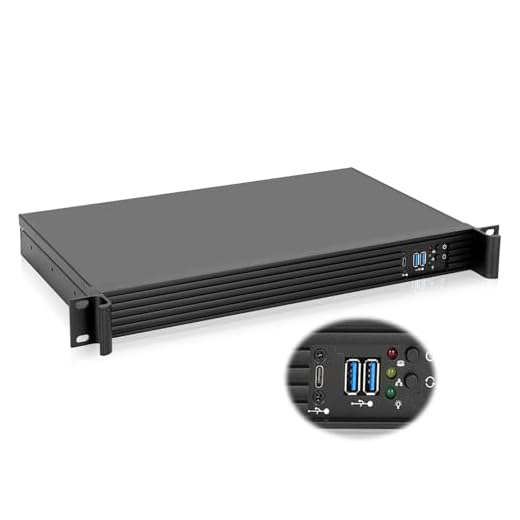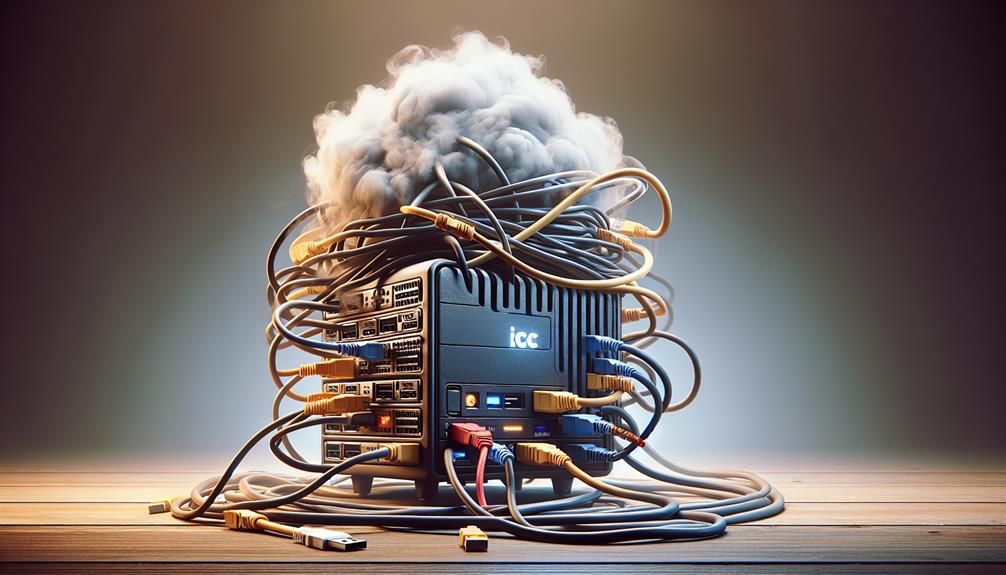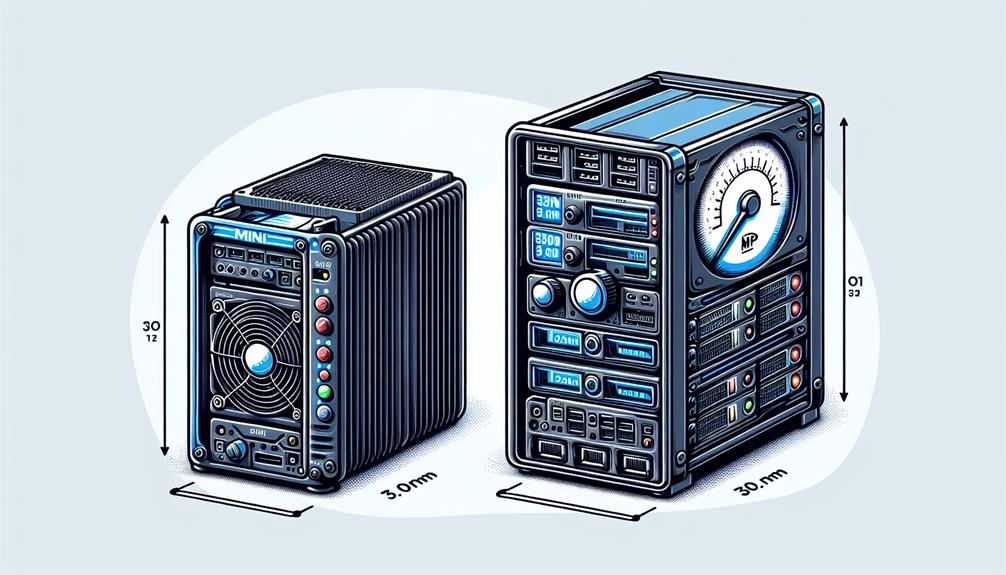



Yes, you can run server software on a Mini PC. Confirm compatibility with hardware specifications, operating system, and performance needs. Mini PCs offer space-saving benefits, cost-efficiency, and portability. Monitor power consumption, temperatures, and consider hardware upgrades for peak performance. Implement cooling solutions and proper ventilation for best operation. Mini PCs have limitations in scalability and processing power, so evaluate your server requirements carefully. Understanding these factors will help you make the most of using a Mini PC as a server platform. Additional insights can further enhance your Mini PC server experience.
Key Takeaways
- Mini PCs can run server software efficiently.
- Consider hardware limitations for workload management.
- Ensure compatibility with software and hardware specifications.
- Optimize performance through proper resource allocation.
- Implement cooling solutions for sustained peak performance.
Mini PCs as Server Platforms
Mini PCs serve as efficient and compact server platforms for various applications. These devices excel in power consumption efficiency, making them ideal for running server software without consuming excessive energy. The compact size of mini PCs contributes to space-saving benefits, especially in environments where physical space is limited.
In terms of cost-effectiveness, mini PCs offer a budget-friendly solution for setting up server systems. Their initial purchase cost is lower compared to traditional server setups, making them an attractive option for small businesses or individuals on a tight budget. Additionally, mini PCs provide scalability options, allowing users to expand their server capabilities as needed by adding more units or upgrading existing hardware components.
Advantages of Using Mini PCs
Efficiently running server software on a Mini PC can offer numerous advantages for various applications and environments. Mini PCs are known for their energy efficiency, consuming less power compared to traditional servers, which translates into cost savings over time. These compact devices are designed to perform with efficient power consumption, making them an environmentally friendly choice for running server software.
Moreover, the space-saving nature of Mini PCs is a significant advantage, especially in environments where physical space is limited. Their small form factor allows for easy integration into tight spaces or for deployment in areas where larger servers would not be feasible. This space efficiency also contributes to the portability of Mini PCs, making them ideal for situations where mobility is required.
Limitations of Mini PCs for Servers

While Mini PCs offer various advantages for running server software, there are specific limitations that need to be considered in certain scenarios. Hardware limitations play an important role in determining the effectiveness of a Mini PC as a server. Mini PCs usually come with limited processing power, memory, and storage compared to traditional servers. This can hinder their ability to handle large workloads or resource-intensive applications efficiently.
Scalability challenges are another significant limitation of Mini PCs for server use. Mini PCs are not easily scalable compared to traditional server setups. Upgrading components like processors or memory in a Mini PC can be limited by the form factor and compatibility constraints. This can restrict the Mini PC's ability to grow along with the increasing demands of a server environment.
Considering these hardware limitations and scalability challenges, it is essential to evaluate the specific server requirements before opting for a Mini PC as a server solution. While Mini PCs can be suitable for certain lightweight server tasks, they may not be the best choice for high-performance or scalable server applications.
Compatibility of Server Software
Considering the hardware limitations and scalability challenges of Mini PCs for server use, the compatibility of server software becomes a critical factor to evaluate for best performance. When selecting server software for a Mini PC, it is essential to verify that the software requirements are compatible with the Mini PC's hardware specifications. This includes confirming that the server software is supported by the Mini PC's processor, memory, storage, and networking capabilities.
Furthermore, the operating system supported by the Mini PC plays an important role in determining the compatibility of server software. It is important to check whether the server software is compatible with the operating system running on the Mini PC. Some server software may require specific versions of operating systems or dependencies that may not be supported on all Mini PCs.
Performance Considerations

To optimize server performance on a Mini PC, prioritize resource allocation and software configuration. When running server software on a Mini PC, be mindful of power consumption to guarantee efficient operation. Mini PCs have limited cooling capabilities, so monitor temperatures closely and consider additional cooling solutions if necessary to prevent overheating and maintain performance.
When evaluating performance, consider hardware upgrades and expansion options. Upgrading components like RAM or storage can greatly improve server speed and responsiveness. Mini PCs may offer limited expansion capabilities, so choose components carefully to maximize performance within these constraints.
Balancing power consumption, cooling, and hardware upgrades is essential for peak server performance on a Mini PC. By carefully managing these factors and configuring software settings appropriately, you can create a reliable and efficient server setup despite the Mini PC's compact size.
Best Practices for Mini PC Servers
Implementing proper cooling solutions is essential for maintaining peak performance on a Mini PC server. Mini PCs, due to their compact size, can experience heat buildup, impacting power consumption and overall efficiency. To address this, consider using external cooling fans or heat sinks to regulate temperature and prevent thermal throttling. Monitoring power consumption is important, as Mini PCs have limited resources compared to traditional servers. Opt for energy-efficient components and make sure the server is not overloaded to optimize power usage.
When setting up your Mini PC server, place it in a well-ventilated area with sufficient airflow to aid in cooling. Regularly clean dust from the vents and fans to prevent blockages that could lead to overheating. Additionally, consider installing software to monitor temperature and power usage to detect any anomalies promptly.
Disclosure: As an Amazon Associate, I earn from qualifying purchases.



